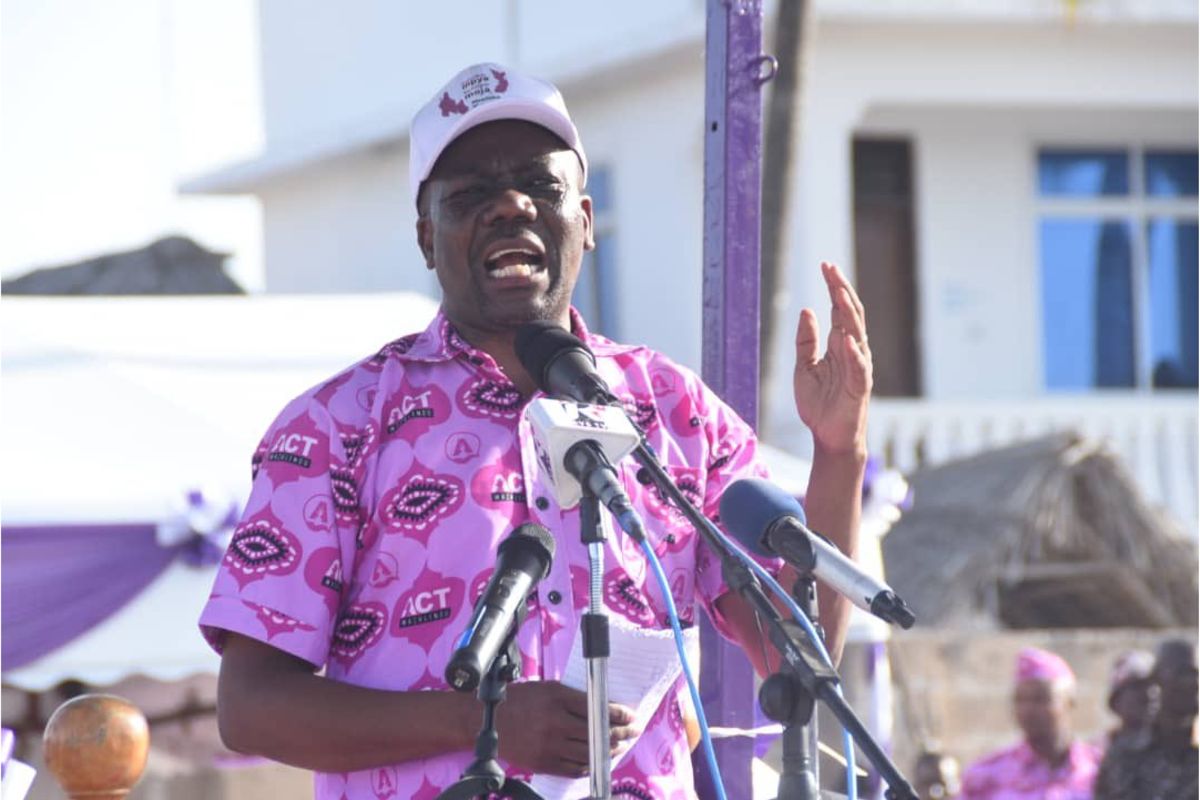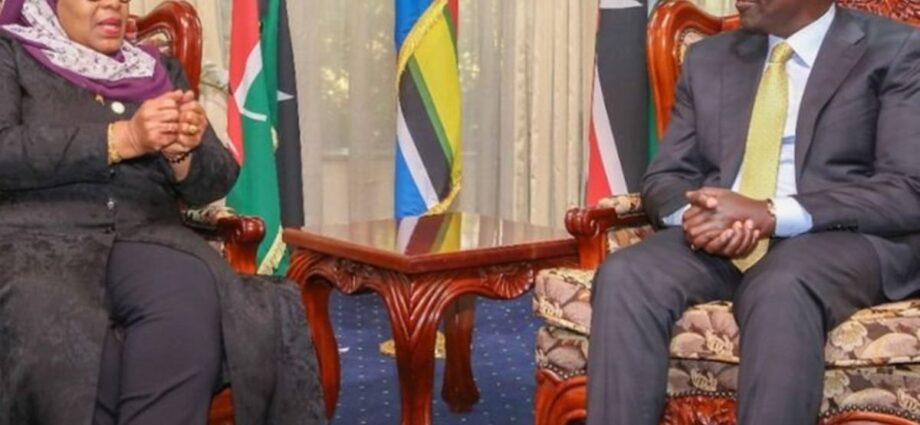Tanzania and Kenya have always maintained positive ties in politics and trade. However, often times there arise some issues, specifically trade spats that tend to threaten the cordial relations that have existed for years, destabilizing the unity in the East African Community which is aiming to consolidate the common market agenda and economic integration.
It therefore comes as good news that President Ruto has chosen Tanzania the first country to visit following his swearing in. His visit is an opportune time for the two countries to sit down and discuss a prosperous way forward.
Tanzania’s President Samia Suluhu Hassan has been at the forefront of pushing diplomacy and has maintained her regime’s intention to rebuild broken relations and forge new allies globally. As such, Ruto’s visit is yet again another opportunity for President Hassan to penetrate her vision of state friendliness and building rapport with neighbours.
It is true that there are many issues up for discussion between Tanzania and Kenya. Recently we saw cases alluding to unfair treatment at the border posts of the two nations in relation to export and import of maize. This has been a recurrent issue where traders from each country complain of unfair treatment or denied entry at the border on grounds of regulatory requirement.
When President Hassan made her first state visit to Kenya in May, 2021 and met with Ruto’s predecessor, Uhuru Kenyatta, the two leaders discussed key issues pertinent to the Tanzania-Kenya ties.
Some of the major areas addressed included resolving trade hurdles such as non-tariff barriers that had continued to hamper smooth running of businesses. Also on the agenda was the issue of border operations during Covid.
Following the visit and meeting between the two leaders, Tanzania and Kenya softened border control, non-tariff barriers were addressed and solutions to bilateral trade helped to boost business performance. With this, Tanzania’s exports to Kenya doubled within a period of 10 months, which led to the former having the upper hand on trade balance by exporting more than it is importing.
Positive results
The government’s strategy to resolve obstacles worked and with it came positive results. Now, with a new regime in charge in Kenya, the two leaders need to sit down and see which areas need to be reassessed, and which new leads need to take shape.
President Ruto is well aware of the significant role Tanzania plays in inter-regional affairs, and will thus look for a way to cooperate with President Hassan’s government and the governments of the wider East African Community as the bloc seeks to maintain the strides attained in recent years which have made it one of the most organized and prosperous regional blocs in Africa.
Matters to be addressed during President Ruto’s visit will determine how Tanzania and Kenya work together in the coming months and years.
Share this news
This Years Most Read News Stories

Loud calls for investigation of Zanzibar port, ZSSF & airport
The leader of the ACT Wazalendo, Zitto Kabwe has raised three key issue that he said are hindering the economy of ZanzibarContinue Reading

Tanzania Confirms Outbreak of Marburg Virus Disease
Dodoma — Tanzania today confirmed an outbreak of Marburg virus disease in the northwestern Kagera region after one case tested positive for the virus following investigations and laboratory analysis of suspected cases of the disease.
President of the Republic of Tanzania, Her Excellency Samia Suluhu Hassan, made the announcement during a press briefing alongside World Health Organization (WHO) Director-General, Dr Tedros Adhanom Ghebreyesus, in the country’s administrative capital Dodoma.
“Laboratory tests conducted in Kabaile Mobile Laboratory in Kagera and later confirmed in Dar es Salaam identified one patient as being infected with the Marburg virus. Fortunately, the remaining suspected patients tested negative,” the president said. “We have demonstrated in the past our ability to contain a similar outbreak and are determined to do the same this time around.”
A total of 25 suspected cases have been reported as of 20 January 2025, all of whom have tested negative and are currently under close follow-up, the president said. The cases have been reported in Biharamulo and Muleba districts in Kagera.
“We have resolved to reassure the general public in Tanzania and the international community as a whole of our collective determination to address the global health challenges, including the Marburg virus disease,” said H.E President Hassan.
WHO is supporting Tanzanian health authorities to enhance key outbreak control measures including disease surveillance, testing, treatment, infection prevention and control, case management, as well as increasing public awareness among communities to prevent further spread of the virus.
“WHO, working with its partners, is committed to supporting the government of Tanzania to bring the outbreak under control as soon as possible, and to build a healthier, safer, fairer future for all the people of Tanzania,” said Dr Tedros. “Now is a time for collaboration, and commitment, to protecting the health of all people in Tanzania, and the region, from the risks posed by this disease.”
Marburg virus disease is highly virulent and causes haemorrhagic fever. It belongs to the same family as the virus that causes Ebola virus disease. Illness caused by Marburg virus begins abruptly. Patients present with high fever, severe headache and severe malaise. They may develop severe haemorrhagic symptoms within seven days.
“The declaration by the president and the measures being taken by the government are crucial in addressing the threat of this disease at the local and national levels as well as preventing potential cross-border spread,” said Dr Matshidiso Moeti, WHO Regional Director for Africa. “Our priority is to support the government to rapidly scale up measures to effectively respond to this outbreak and safeguard the health of the population,”
Tanzania previously reported an outbreak of Marburg in March 2023 – the country’s first – in Kagera region, in which a total of nine cases (eight confirmed and one probable) and six deaths were reported, with a case fatality ratio of 67%.

Sign up for free AllAfrica Newsletters
Get the latest in African news delivered straight to your inbox
In the African region, previous outbreaks and sporadic cases have been reported in Angola, the Democratic Republic of the Congo, Ghana, Kenya, Equatorial Guinea, Rwanda, South Africa and Uganda.
Marburg virus is transmitted to people from fruit bats and spreads among humans through direct contact with the bodily fluids of infected people, surfaces and materials. Although several promising candidate medical countermeasures are currently undergoing clinical trials, there is no licensed treatment or vaccine for effective management or prevention of Marburg virus disease. However, early access to treatment and supportive care – rehydration with oral or intravenous fluids – and treatment of specific symptoms, improve survival.
Source: allafrica.com

Zanzibar liquor importers face fresh hurdle despite court order
The liquor shortage in Zanzibar is far from over, even after a court order granted relief to the three importers.Continue Reading











